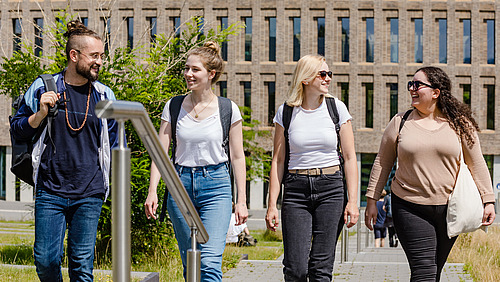Contemporary diagnoses respond to a social need for interpretation by highlighting certain social phenomena as characteristic, interpreting them sociologically in a new way and presenting these interpretations to the public for discussion. "Our aim is to enable students to understand the theoretical prerequisites and methodological requirements of this type of sociological research," says sociologist Prof. Dr. Kai-Olaf Maiwald.
However, the relationship between sociology and society and the requirements of sociological knowledge transfer are also central topics in the new degree program, which is unique in this form in Germany. "When designing the course, it was particularly important to us that students not only receive general information about sociological diagnoses of time, but also gain experience in the field of such research and in the practical communication of its results," says his colleague Prof. Dr. Lars Gertenbach.
In line with the focus of sociological diagnoses of time, the course is designed to offer a considerable degree of thematic openness, flexibility and proximity to research, adds Prof. Gertenbach. In addition to imparting theoretical and methodological knowledge in seminars, an important emphasis is placed on participation in the implementation of such research in the context of teaching research on changing, current topics. As part of a "Jour fixe" offered every semester, students can also explore topics in greater depth, organize workshops and discuss their own ideas for the Master's thesis across cohorts. The elective area offers further opportunities for students to set their own priorities in their studies. Courses in the fields of public sociology, i.e. sociology that focuses on social experiences and questions of interpretation, and scientific organization, as well as an internship, introduce students to professional fields that are linked to the course's skills profile.
A total of 25 places are available. Applicants must have a BA degree in sociology or social sciences, in a two-subject Bachelor's degree in sociology or in another suitable subject. A degree program is considered suitable if modules/courses amounting to at least 60 credit points from the areas of theory, methods and other sociological subject areas can be demonstrated. Applications from May 7 at https://hisinone.dienste.uni-osnabrueck.de/qisserver/pages/cs/sys/portal/hisinoneStartPage.faces?page=Bewerbende&noDBAction=y&init=y
Further information for the media:
Prof. Dr. Lars Gertenbach, Osnabrück University
School of Cultural Studies and Social Sciences
lars.gertenbach@uni-osnabrueck.de
Prof. Dr. Kai-Olaf Maiwald, Osnabrück University
School of Cultural Studies and Social Sciences
kai-olaf.maiwald@uos.de





